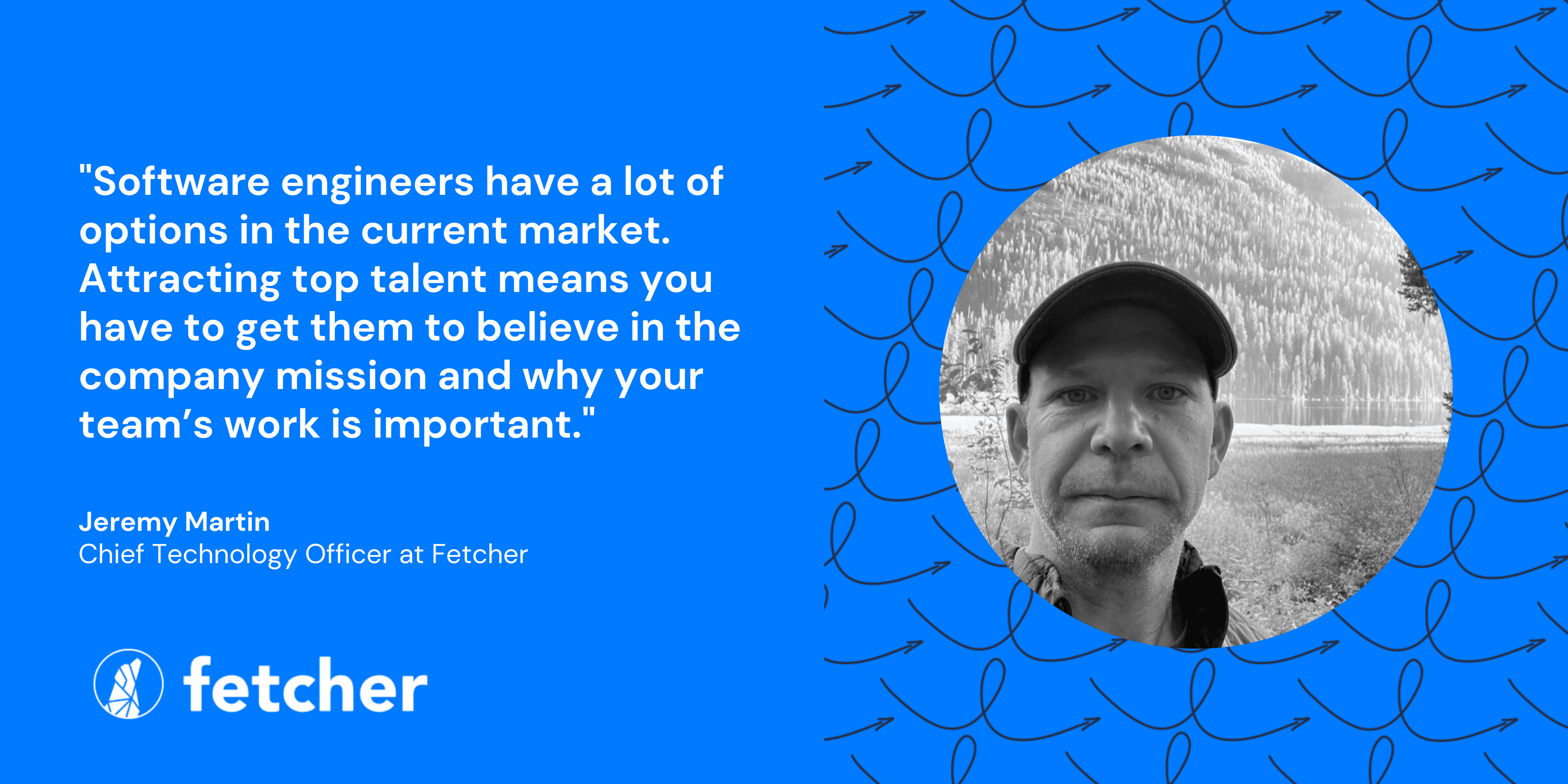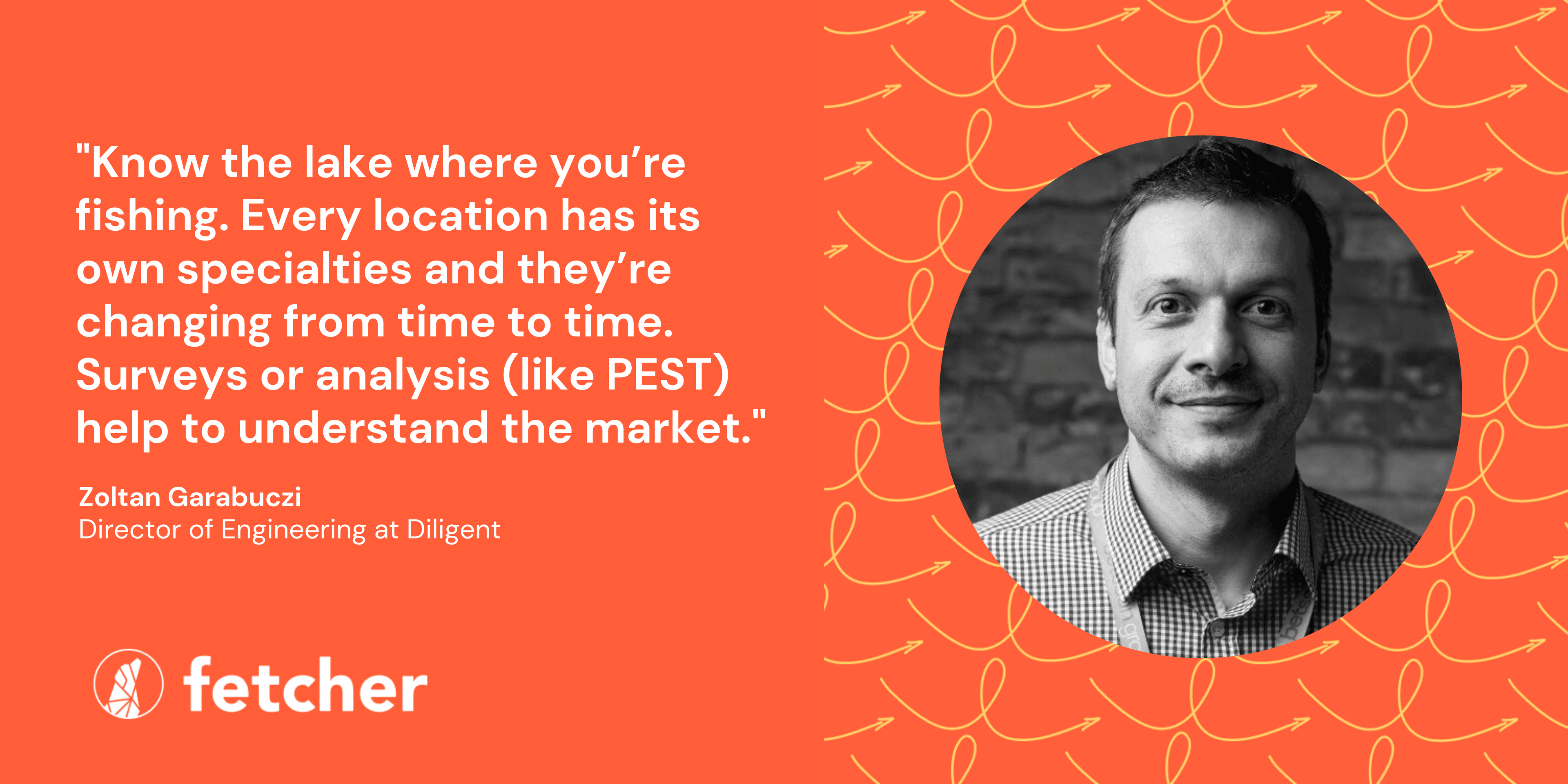The world of tech hiring continues to become more competitive and nuanced. When recruiting software engineers, it's crucial to employ the best strategies to reach and engage the most qualified and experienced candidates.
We asked engineering and IT leaders and business executives what they are doing to compete in today’s battle for software engineers and developers. Below, we dive into their advice, which falls into six main categories:
1. Highlight Your Tech Stack and Innovative Projects
Engineers are the masterminds behind innovative products, so it's no surprise they want to work with cutting-edge technology. By showcasing your tech stack, you provide candidates with a clear understanding of the role and the technologies they'll be working with—a key factor when recruiting software developers.
“This was the number one topic for almost all developers I interviewed or hired, particularly those early in their careers. They scan job listings for technology keywords—programming languages, databases, cloud vendors, and buzzwords like AI, blockchain, AR—and compare rankings. They want opportunities to learn new, modern tech to enhance their profiles,” says Stefan Radulian, VP of Product Management at Diligent.
Stefan notes that while an innovative tech stack is a significant draw for less experienced engineers, more senior developers recognize that the biggest challenges in software engineering remain relatively constant, regardless of tech. For companies with legacy systems, he suggests promoting the opportunity to modernize a tech stack—a valuable experience for those recruiting software engineers aiming to attract top talent.
“To attract talent, I recommend emphasizing how the tech will help them advance their careers for the next decade. This is a nuance often forgotten in the 'what's in it for me' section,” adds Stefan.
2. Emphasize Career Development and Continuous Learning
Training, education, and professional development go hand-in-hand with access to top tech. When recruiting software engineers, showcasing opportunities for growth can set your organization apart.
“Companies should invest in a solid education strategy that provides employees with self-paced learning opportunities, remote education options like webinars, conferences, or networking events, so developers' skills stay top-notch. Software developers need to be proactive about keeping up their knowledge—but companies need to provide them support too if they want to attract the most talented engineers in this competitive job market,” says Haya Subhan, Manager and HR Specialist at Sheffield First Aid Courses.
Showcasing possibilities for continuous learning and skill development demonstrates that your organization is invested in the individual software engineer's future.
“Technologists like being able to innovate, think outside of the box, and challenge the status quo. Creating a culture that fosters this environment is very compelling for candidates as it demonstrates an area where they will be able to add value and move the dial, ultimately providing them with a platform to grow their career,” adds Amar Keshani, Director at Baringa Partners.
Innovative tools, training, and mindsets are essential for retaining talent, too. Amar notes that many software engineers lose interest and start looking for new opportunities when they feel their work environment no longer supports this culture.
3. Align with Their Values and Purpose
While compensation and benefits play a role in a candidate’s decision, more than ever, software engineers are looking for companies that align with their personal values and mission. When recruiting software engineers, it's important to communicate your organization's purpose and how it resonates with potential hires.
“Salary and benefits are important barometers that are perceived as a measure of how they are valued, but they only need to be good enough to be a footnote in discussions. Ultimately, this is a sugar rush that does not survive more intrinsic demotivating forces,” notes Mark Dunlop, Head of Engineering at Xero.
To Mark’s point, salary and benefits are no longer the differentiators in many cases—organizations that make their big-picture goals clear are the ones gaining an advantage with tech talent. Jeremy Martin, Fetcher’s Chief Technology Officer, agrees that painting a picture of how and why their work is going to be meaningful is key when recruiting software developers.

In addition to the impact a role will have on the company and its customers, social responsibility has become a part of the conversation when hiring software engineers. Amar at Baringa says he’s seen an increase in candidates mentioning that they were specifically seeking out B-Corp certified companies. These certifications add an additional layer of validation for prospects trying to align their values with their professional work.
“Software engineers understand that they possess a very relevant talent that can have a significant impact on society, and they want to use it for something good,” adds Stefan Radulian. “They are looking for a company that sparks their intrinsic motivation and offers a meaningful job that makes them feel good about what they're doing.”
4. Stay Informed About the Hiring Landscape
You can’t win the talent acquisition game if you aren’t paying attention to the rest of the field. Staying informed is crucial when recruiting software engineers in today's dynamic market. Zoltan Garabuczi, Diligent’s Director of Engineering, stresses the importance of keeping a pulse on your competitors and on trends with candidates.

For example, global events can significantly impact the job market and candidates’ priorities. You need to be aware of these changes to adapt your strategies accordingly.
Additionally, you’ve got to keep an eye on companies in your market—what they are doing to attract candidates and updates on their workforce. In the event of layoffs, a quick reaction time is key to reaching qualified talent looking for a new role.
In addition to competitors and candidates, talent teams need to consider which candidates will help them navigate their current and upcoming challenges.
“In 2023, it is crucial that recruitment teams hunt down candidates with a wide range of experiences and skills because this year will be a tumultuous and highly challenging one,” says Brendan Mcgreevy, Head of Strategy at Affinda.
Arkadiusz Terpilowski, Head of Growth & Co-founder at Primetric, agrees. He always looks for candidates who have a history of staying current with the latest technologies and programming languages—this could be through attending conferences, contributing to open-source projects, or pursuing personal projects.
“Technology is advancing at such a rapid pace, and it's absolutely crucial that your team members can keep up and adapt to these changes,” adds Arkadiusz.
5. Promote Your Team and Their Achievements
Employer branding goes beyond showcasing awards; it's about highlighting your team's expertise and the impactful work they're doing. Engineers want to be inspired by who they work with and what they can achieve together. This is a powerful strategy when recruiting software engineers who are looking for a vibrant and successful team environment.
“In 2021, I hired approximately 25 engineers for a new development group in Hungary. With COVID restrictions, it was impossible to be on-site, so the first few hires were crucial in establishing a leadership beachhead,” says Mark from Xero. Because these key hires quickly bought into the mission and led with confidence, Mark saw a high acceptance rate and grew the team rapidly.
Earlier in his career, Mark was hiring a dozen engineers for two teams at a Telematics company. Even a decade ago, the market was very competitive, but he found that establishing a solid team early on paid off in the long run by attracting more engineering talent.
“As the team grew, it became well known for the type of work it was doing, the level of success, and the culture it was establishing. Others wanted to join for both the challenge and the vibrancy,” says Mark.
6. Provide an Exceptional Candidate Experience
Even with a compelling tech stack, inspiring values, and a strong team, the candidate experience is paramount. A positive, personalized, and efficient hiring process can set you apart when recruiting software developers.
Justin Vajko, Founder & CEO at Dialog Employer Branding, suggests knowing your candidates’ main questions ahead of time and proactively answering them.
“Ask your current team what they wanted to know when changing jobs. Then, record the answers by asking them to your hiring manager over video. Turn each answer into a video, and let your recruiting team use them in outbound LinkedIn messaging. You can also put them all on one page on your website to give discerning candidates a clear idea of what it's like to work for you,” says Justin.
Regarding technical assessments, consider your approach carefully. Ben Schwencke, Lead Consultant at Test Partnership, advises tailoring coding tests based on experience levels.
“Coding tests are a common sticking point for software engineers, especially for experienced hires. Requiring candidates to complete them signals the employer doesn't trust their expertise, frustrating more experienced engineers,” adds Ben.
Soft skills like adaptability and effective communication are equally important, especially for senior-level roles. Recognizing this can enhance your strategy for recruiting software engineers who will contribute positively to your team dynamics.

“Soft skills can be just as essential as technical prowess for staying ahead of trends and maintaining a competitive edge. Ultimately, hiring software engineers with both technical and soft skills is essential for creating a strong team to help your organization succeed,” adds Nuria Requena at Spacelift.
Final Thoughts on Recruiting Software Engineers
Because of the ongoing shortage of technical talent, recruiters may feel like they can never catch up with demand. It may be tempting to turn to generic messaging and blanket recruiting tactics. However, many experts emphasize that companies need to treat engineering candidates as individuals with distinct goals, preferences, and backgrounds to win them over—and retain them in the long run.
“The important thing to remember is that no two candidates are going to be the same in what they seek, so demonstrating adaptability to their needs is going to be a key differentiator for them,” says Amar at Baringa.
Helping talent teams source and engage software engineers is one of Fetcher’s specialties! If you're focused on recruiting software engineers, reach out to us to learn more about our recruiting automation platform and get a demo that’s personalized to your organization’s hiring needs.
About Fetcher
Our mission is to help you engage talent that will transform your business aspirations into reality. Great talent is hard to find—that's why we offer a talent sourcing platform that not only gets your brand in front of the right candidates but also gives you a competitive edge in talent acquisition.
Begin building a relationship with your next great hire today and let Fetcher handle the rest. Learn more.




